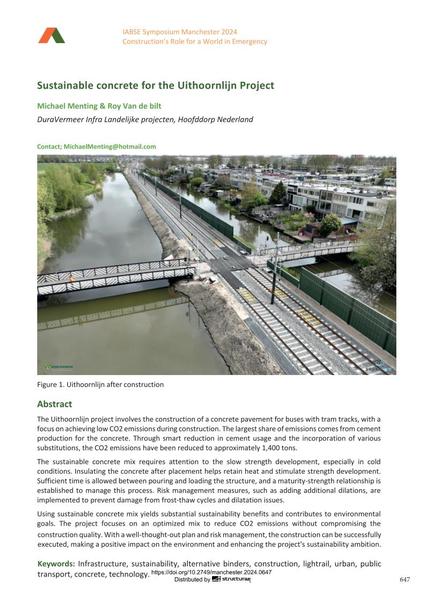Sustainable concrete for the Uithoornlijn Project

|
|
|||||||||||
Bibliografische Angaben
| Autor(en): |
Michaël Menting
(DuraVermeer Infra Landelijke projecten, Hoofddorp Nederland)
Roy van de Bilt (DuraVermeer Infra Landelijke projecten, Hoofddorp Nederland) |
||||
|---|---|---|---|---|---|
| Medium: | Tagungsbeitrag | ||||
| Sprache(n): | Englisch | ||||
| Tagung: | IABSE Symposium: Construction’s Role for a World in Emergency, Manchester, United Kingdom, 10-14 April 2024 | ||||
| Veröffentlicht in: | IABSE Symposium Manchester 2024 | ||||
|
|||||
| Seite(n): | 647-654 | ||||
| Anzahl der Seiten (im PDF): | 8 | ||||
| DOI: | 10.2749/manchester.2024.0647 | ||||
| Abstrakt: |
The Uithoornlijn project involves the construction of a concrete pavement for buses with tram tracks, with a focus on achieving low CO₂ emissions during construction. The largest share of emissions comes from cement production for the concrete. Through smart reduction in cement usage and the incorporation of various substitutions, the CO₂ emissions have been reduced to approximately 1,400 tons. The sustainable concrete mix requires attention to the slow strength development, especially in cold conditions. Insulating the concrete after placement helps retain heat and stimulate strength development. Sufficient time is allowed between pouring and loading the structure, and a maturity-strength relationship is established to manage this process. Risk management measures, such as adding additional dilations, are implemented to prevent damage from frost-thaw cycles and dilatation issues. Using sustainable concrete mix yields substantial sustainability benefits and contributes to environmental goals. The project focuses on an optimized mix to reduce CO₂ emissions without compromising the construction quality. With a well-thought-out plan and risk management, the construction can be successfully executed, making a positive impact on the environment and enhancing the project's sustainability ambition. |
||||
| Stichwörter: |
Beton Nachhaltigkeit Infrastruktur Technik
|
||||
